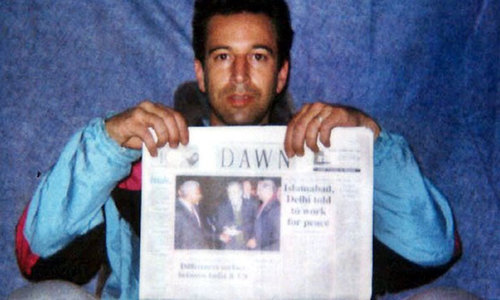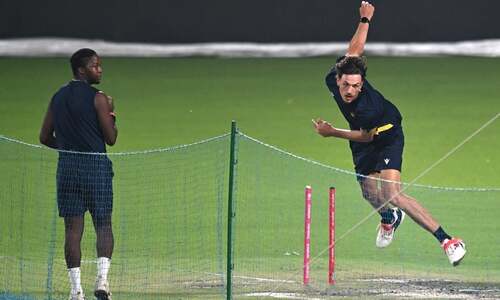Sindh High Court on Thursday overturned the murder conviction of Ahmed Omer Saeed Sheikh, the man found guilty of the kidnapping and killing of Wall Street Journal reporter Daniel Pearl.
Instead, the court found Sheikh guilty of the lesser charge of kidnapping and sentenced him to seven years in prison.
One of his lawyers, Khwaja Naveed, told AP he could go free unless the government chooses to challenge the court decision.
Saeed has already spent 18 years in prison on death row. The seven-year sentence was expected to be counted as time served, said Naveed.
The Sindh High Court also acquitted three others accused in the case: Fahad Naseem, Sheikh Adil, and Salman Saqib, who were earlier sentenced to life in prison.
“Justice has been done to my clients,” said Naveed.
A two-judge bench, headed by Justice Mohammad Karim Khan Agha, announced the verdict on the appeals filed by the convicts 18 years ago after hearing arguments and examining the record and proceedings of the case.
The SHC further dismissed an appeal of the state seeking enhancement of life term of three co-accused.
Murder case
Pearl, 38, was the South Asia bureau chief for The Wall Street Journal when he was abducted in Karachi in January 2002 while researching a story about religious extremists in Karachi.
A graphic video showing his decapitation was delivered to the US consulate in the city nearly a month later. Omar Sheikh was arrested in 2002 and sentenced to death by an anti-terror court.
While arguing the case, the lawyers for the appellants, Rai Bashir and Khawaja Naveed Ahmed, had submitted that the prosecution had miserably failed to prove its case against their clients beyond any reasonable doubt and prosecution witnesses were mostly policemen, whose testimonies could not be relied upon.
They had further contended that Naseem and Adil Sheikh's confessions before a judicial magistrate were defective and not voluntary.
They had argued that the recovery of the laptop from Naseem was shown to have been made on Feb 11, 2002, while computer expert Ronald Joseph had deposed that he was given the computer for verification on Feb 4 and he examined the laptop for six days.
Deputy Prosecutor General Saleem Akhtar had supported the trial court’s verdict and submitted that the prosecution had proved its case against the appellants beyond a shadow of doubt and had requested the court to dismiss the appeals.
Wrongful convictions?
In January 2011, a report released by the Pearl Project at Georgetown University following an investigation into his death made chilling revelations, claiming that the wrong men were convicted for Pearl's murder.
In 2014, an anti-terrorism court acquitted Qari Hashim, who had been arrested in the case in 2005. The judge at the time said there was a lack of evidence in the case.
The investigation, led by Pearl's friend and former Wall Street Journal colleague Asra Nomani and a Georgetown University professor, claimed the reporter was murdered by Khalid Sheikh Mohammed, the alleged mastermind of the September 11 2001 attacks, not Omar Sheikh.
Mohammed, better known as KSM, was arrested in Pakistan in 2003 and is being held in Guantanamo Bay. A US psychologist who interviewed KSM said the prisoner had told him that he had beheaded Pearl.
Correction: An earlier version of this story stated that Sheikh's death sentence was commuted, which is incorrect. The death sentence has been set aside. The copy has been amended and the error is regretted.
Additional reporting by Shafi Baloch.
































